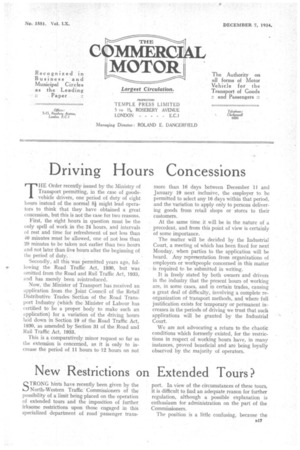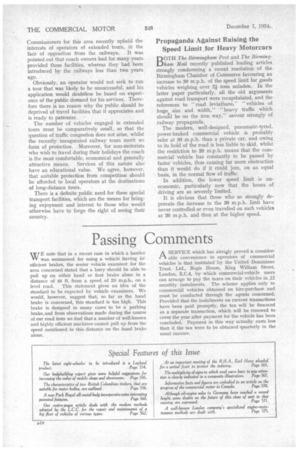New Restrictions on Extended Tours?
Page 31

Page 32

If you've noticed an error in this article please click here to report it so we can fix it.
STRONG hints have recently been given by the North-Western Traffic Commissioners of the possibility of a limit being-placed on the operation of extended tours and the imposition of further irksome restrictions upon those engaged in this specialized department of road passenger trans port. In view of the circumstances of these tours, it is difficult to find an adequate reason for further regulation, although a possible explanation is enthusiasm for administration on the part of the Commissioners.
The position is a little confusing, because the Commissioners for this area recently upheld the interests of operators of extended tours, in the face of opposition from the railways. It was pointed out that coach owners had for many years provided these facilities, whereas they had been introduced by the railways less than two years ago.
Obviously, an operator would not seek to run a tour that was likely to be unsuccessful, and his application would doubtless be based on experience of the public demand for his services. Therefore there is no reason why the public should be deprived of travel facilities that it appreciates and is ready to patronize.
The number of vehicles engaged in extended tours must be comparatively small, so that the question of traffic congestion does not arise, whilst the recently inaugurated railway tours merit no form of protection. Moreover, for non-motorists who wish to travel during their holidays the coach is the most comfortable, economical and generally attractive means. Services of this nature also have an educational value. We agree, however, that suitable protection from competition should be afforded to local operators at the destinations of long-distance tours.
There is a definite public need for these special transport facilities, which are the means for bringing enjoyment and interest to those who would otherwise have to forgo the right of seeing their country.
Propaganda Against Raising the Speed Limit .for Heavy Motorcars
BOTH The Birmingham Post and The Birmingham Mail recently published leading articles strongly condemning a recent resolution of the Birmingham Chamber of Commerce favouring an increase to 30 m.p.h. of the speed limit for goods vehicles weighing over 2i. tons unladen. In the latter paper particularly, all the old arguments against road transport were recapitulated, and the references to " road leviathans," " vehicles of huge. size and width," "heavy traffic which should be on the iron way," savour strongly of railway propaganda.
The modern, well-designed, pneumatic-tyred, power-braked commercial vehicle is probably safer at 30 m.p.h. than a private car, and owing to its hold of the road is less liable to skid, whilst the restriction to 20 m.p.h. means that the commercial vehicle has constantly to be passed by faster vehicles, thus causing far more obstruction than it would do if it could join, on an equal basis, in the normal flow of traffic.
In addition, the lower speed limit is uneconomic, particularly now that the hours of driving are so severely limited.
It is obvious that those who so strongly deprecate the increase to the 30 m.p.h. limit have never controlled or even travelled on such vehicles at 20 m.p.h. and then at the higher speed.




























































































